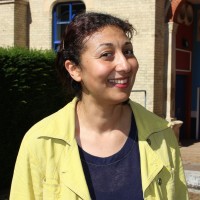CAO
A Q&A with the Course Leader for “Evidence Analysis and Decision-Making in Policy”
CAO
A Q&A with the Course Leader for “Evidence Analysis and Decision-Making in Policy”
Deciphering Decision-Making: Insights from Professor Magda Osman
Professor Magda Osman is the Head of Research and Analysis at the Centre for Science and Policy, University of Cambridge. She is also the Visiting Professor of Policy Impact at Leeds Business School, University of Leeds.
Magda is the course lead for Evidence Analysis and Decision-Making in Policy, a short 6-week online course from the University of Cambridge and the Centre for Science and Policy (CSaP). Today, she answers a series of questions about her research interests, why decision-making has captured her fascination, and what she hopes learners will take away from her course.
What are your current research interests?
“Many of us believe that subliminal advertising is a real phenomenon that is used to influence our consumer choices, despite the fact that it is a myth.”
I’ve recently been focused on conducting research around what makes a good question, specifically in the context of research questions designed to inform evidence-based policy-making. Basically, how we look for evidence, even if it is to answer the same problem, critically varies by profession. While this might be intuitively obvious, the recent work that my group has been doing helps to show, based on a new classifying system, what the patterns are in the types of questions policy professionals typically ask, and what types of questions academics tend to ask.
When it comes to deciding on what a good question looks like, our findings are somewhat unintuitive. We all tend to think that being brief and to the point is best, but the experimental work we have conducted shows that for open ended issues, people generally prefer longer phrased questions, but for areas where a clear set of options is available, people prefer short questions. This implies that the quality of a question isn’t dependent on length alone, but also depends upon the type of problem at hand. While this is exciting from the point of view of research, this also has practical value, because we can start to map out ways for constructing better questions. If we can ask the right question given the problem, we are more likely to find an appropriate solution to it.
One of my earliest research interests was looking at the way in which we make decisions and how that is influenced by the level of control we think we have and what other influences there are over what we do. For instance, many of us believe that subliminal advertising is a real phenomenon that is used to influence our consumer choices, despite the fact that it is a myth. I have been interested in this issue more generally, looking at what beliefs we commonly share about the influences that exist and direct our choices without our awareness, and in turn without our control.
I’ve run quite a few recent experiments to show that there are common beliefs about where we suspect that psychological tactics are used to influence us without our awareness. The question is, do we still think we have free choice, even if we suspect that influences beyond our awareness are taking place?, The answer is yes! There are a variety of reasons for why the answer ‘yes’ is sensible, and more importantly, what it tells us about how important it is to maintain the feeling that we still have control and free choice in our day to day lives.
What do you find so interesting about the field of decision-making?
“More interesting than studying the unconscious, is studying…how they use the concept to explain their own behaviours.”
I think people generally find the unconscious one of the most interesting aspects of psychology, and it also turns out to be one of my favourite areas to research. The funny thing is that where psychologists have tried to show the influence of the unconscious, I have ended up showing that it doesn’t play much, if any, role, particularly in my work on decision-making, reasoning, learning, and problem solving.
So, I recently switched tactic. This is because I realised that what is more interesting than studying the unconscious, is studying what people understand about what the unconscious is, and how they use the concept to explain their own behaviours. This is also why I find the connection between people’s beliefs in the unconscious and where it might influence their decisions is so revealing. It tells us a lot about what we are happy to take responsibility for, where we have concerns, especially when it comes to contexts such as politics, social media and consumer contexts, as the findings from my research show.
What do you hope learners will gain from this course?
“The real world is messy, and constantly changing, especially so in the world of public policy.”
Professionals interested in this course are likely to already be tackling a lot of complicated situations in their roles and making important decisions on their own, or in groups. They are having to find ways of evidencing and persuading others about decisions that are being taken. The real world is messy, and constantly changing, especially so in the world of public policy. Their problems aren’t called wicked problems for nothing!
The aim of this course is to give learners practical ways to critically appraise a problem and map it out in a manageable way to reveal the best path to making a decision and what evidence is needed to support it. Along the way I also hope that the course is a vehicle for our learners to share their experiences with peers, and to gain valuable insights from each other. Finally, I really hope that the course is thought-provoking for them, challenging their assumptions about policy-making, and helping them to develop a deeper appreciation for the value of the question ‘why’.
Join Magda for her “Evidence Analysis and Decision-Making in Policy” course, created by University of Cambridge Online with Cambridge’s Centre for Science and Policy (CSaP).
Explore our range of online courses led by University of Cambridge academics, and learn from thought leaders at the forefront of academic research. Visit our website for more information: advanceonline.cam.ac.uk(Opens in a new window)



